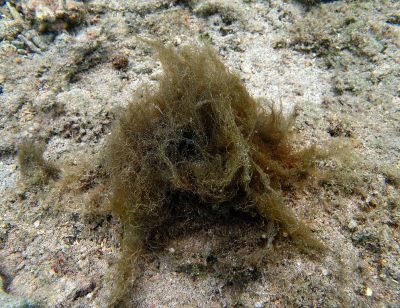Anticancer agents in marine cyanobacteria

Lyngbya majuscula
By Philippe Bourjon (Own work) [CC BY-SA 4.0 (http://creativecommons.org/licenses/by-sa/4.0)], via Wikimedia Commons
A species of tropical marine cyanobacteria, Lyngbya majuscula, is the source of nearly 300 natural products. Some of them may help in the treatment of cancer, diabetes, HIV and Alzheimer's disease.
The 'Cyp-450 biosynthesis of Lyngbya majuscula natural products' (LYNGBYA-KENYA) project was established to clone and express the gene clusters responsible for the important anticancer agents. The initiative focused on the cytochrome p450 biosynthesis of L. majuscula natural products, namely modular cyclodepsipeptides homodolastin 16 (HMDS 16) and antanapeptin A (ANTAP A).
L. majuscula was collected from Shimoni on the south-eastern coast of Kenya and its molecular diversity investigated. The cyanobacteria are covered with brightly coloured species of bacteria belonging to phyla known to be important sources of natural products, used for discovering new drugs.
Project members aimed to determine if these compounds originated from the cyanobacteria or from the bacteria found living with it, or both. These microorganisms were gammaproteobacteria, Firmicutes and alphaproteobacteria, which were isolated from the cyanobacteria.
The team used bioinformatics to screen for polyketide synthase/non-ribosomal peptide synthetase megasynthase gene clusters targeting HMDS 16 and ANTAP A. A new method for obtaining the metagenomic DNA of non-axenic cyanobacteria was discovered in this research that helped to obtain the complete genome sequence of L. majuscula from its metagenome. Subsequently gene clusters encoding HMDS 16, ANTAP A and the potent anticancer dolastatin 16 have been identified in the Kenyan L. majuscula genome.
LYNGBYA-KENYA will help to ensure a sustainable supply of marine natural products for potential therapies. Presently a team of scientists from Newcastle University, St Andrews University and Aberystwyth University are working closely with Dr Thomas Dzeha (the researcher) to achieve the heterologous production of these anticancer compounds in a vector. This will improve the quality of life of EU citizens and ensure that Europe remains at the forefront of new drug discoveries.
published: 2015-05-08

